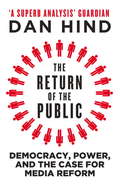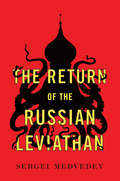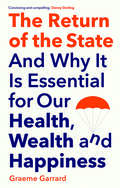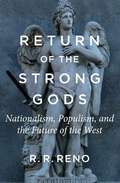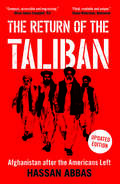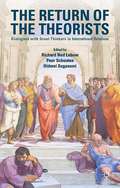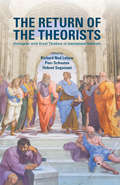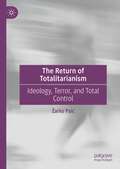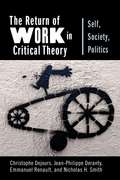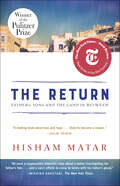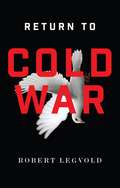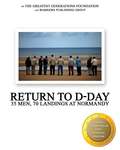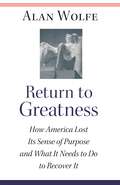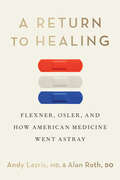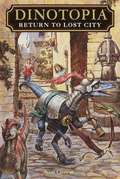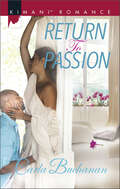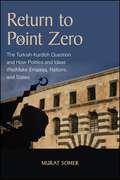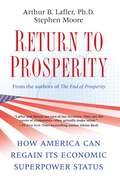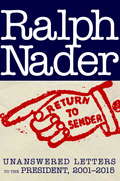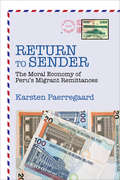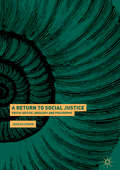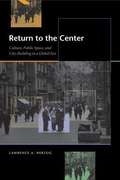- Table View
- List View
The Return of the Primitive
by Ayn Rand Peter SchwartzIn the tumultuous late 60s and early 70s, a social movement known as the "New Left" emerged as a major cultural influence, especially on the youth of America. It was a movement that embraced "flower-power" and psychedelic "consciousness-expansion," that lionized Ho Chi Minh and Fidel Castro and launched the Black Panthers and the Theater of the Absurd. In Return Of The Primitive (originally published in 1971 as The New Left), Ayn Rand, bestselling novelist and originator of the theory of Objectivism, identified the intellectual roots of this movement. She urged people to repudiate its mindless nihilism and to uphold, instead, a philosophy of reason, individualism, capitalism, and technological progress. Editor Peter Schwartz, in this new, expanded version of The New Left, has reorganized Rand's essays and added some of his own in order to underscore the continuing relevance of her analysis of that period. He examines such current ideologies as feminism, environmentalism and multiculturalism and argues that the same primitive, tribalist, "anti-industrial" mentality which animated the New Left a generation ago is shaping society today.
The Return of the Public
by Dan HindUnder the incurious gaze of the major media, the political establishment and the financial sector have become increasingly deceitful and dangerous in recent years. At the same time, journalists at Rupert Murdoch's News International and elsewhere have been breaking the law on an industrial scale. Now we are expected to stay quiet while those who presided over the shambles judge their own conduct.In The Return of the Public, Dan Hind argues for reform of the media as a necessary prelude to wider social transformation. A former commissioning editor, Hind urges us to focus on the powers of the media to instigate investigations and to publicize the results, powers that editors and owners are desperate to keep from general deliberation.Hind describes a programme of reform that is modest, simple and informed by years of experience. It is a programme that much of the media cannot bring themselves even to acknowledge, precisely because it threatens their private power. It is time the public had their say.
The Return of the Public in Global Governance
by Jacqueline Best Alexandra GheciuMany international relations scholars argue that private authority and private actors are playing increasingly prominent roles in global governance. This book focuses on the other side of the equation: the transformation of the public dimension of governance in the era of globalization. It analyses that transformation, advancing two major claims: first, that the public is beginning to play a more significant role in global governance, and, second, that it takes a rather different form than has traditionally been understood in international relations theory. The authors suggest that unless we transcend conventional wisdom about the public as a distinct sphere, separate from the private domain, we cannot understand the dynamics and consequences of its apparent return. Using examples drawn from international political economy, international security and environmental governance, they argue that 'the public' should be conceptualized as a collection of culturally-specific social practices.
The Return of the Russian Leviathan (New Russian Thought)
by Sergei MedvedevRussia’s relationship with its neighbours and with the West has worsened dramatically in recent years. Under Vladimir Putin’s leadership, the country has annexed Crimea, begun a war in Eastern Ukraine, used chemical weapons on the streets of the UK and created an army of Internet trolls to meddle in the US presidential elections. How should we understand this apparent relapse into aggressive imperialism and militarism? In this book, Sergei Medvedev argues that this new wave of Russian nationalism is the result of mentalities that have long been embedded within the Russian psyche. Whereas in the West, the turbulent social changes of the 1960s and a rising awareness of the legacy of colonialism have modernized attitudes, Russia has been stymied by an enduring sense of superiority over its neighbours alongside a painful nostalgia for empire. It is this infantilized and irrational worldview that Putin and others have exploited, as seen most clearly in Russia’s recent foreign policy decisions, including the annexation of Crimea. This sharp and insightful book, full of irony and humour, shows how the archaic forces of imperial revanchism have been brought back to life, shaking Russian society and threatening the outside world. It will be of great interest to anyone trying to understand the forces shaping Russian politics and society today.
The Return of the State: And Why it is Essential for our Health, Wealth and Happiness
by Graeme GarrardA vigorous and timely defense of the state as a force for good For decades now wealth and power have been shifting from states to markets. This experiment has been a failure for all but a privileged few. But this trend is beginning to reverse, accelerated by the COVID-19 pandemic, which has seen the state play the most direct and positive role in citizens&’ everyday lives in living memory. Graeme Garrard makes a powerful case for the state as our only realistic hope of countering the rising power of multinational corporations, organized crime, and international organizations that will always put their own interests first. Today the state is essential to the health and welfare of everyone except the rich and powerful. Yet it is being rolled back and whittled away, leaving the well-being of most of us at the mercy of unaccountable private powers that are increasingly free from external control. As Garrard shows, the state is the only realistic way of promoting the public good in our time.
Return of the Strong Gods: Nationalism, Populism, and the Future of the West
by R. R. RenoAfter the staggering slaughter of back-to-back world wars, the West embraced the ideal of the “open society.” The promise: By liberating ourselves from the old attachments to nation, clan, and religion that had fueled centuries of violence, we could build a prosperous world without borders, freed from dogmas and managed by experts. But the populism and nationalism that are upending politics in America and Europe are a sign that after three generations, the postwar consensus is breaking down. With compelling insight, R. R. Reno argues that we are witnessing the return of the “strong gods”—the powerful loyalties that bind men to their homeland and to one another. Reacting to the calamitous first half of the twentieth century, our political, cultural, and financial elites promoted open borders, open markets, and open minds. But this never-ending project of openness has hardened into a set of anti-dogmatic dogmas which destroy the social solidarity rooted in family, faith, and nation. While they worry about the return of fascism, our societies are dissolving. But man will not tolerate social dissolution indefinitely. He longs to be part of a “we”—the fruit of shared loves—which gives his life meaning. The strong gods will return, Reno warns, in one form or another. Our task is to attend to those that, appealing to our reason as well as our hearts, inspire the best of our traditions. Otherwise, we shall invite the darker gods whose return our open society was intended to forestall.
The Return of the Taliban: Afghanistan after the Americans Left
by Hassan AbbasThe first account of the new Taliban—showing who they are, what they want, and how they differ from their predecessors A Newsweek Staffers’ Favorite Book of 2023 Since the fall of Kabul in 2021, the Taliban have effective control of Afghanistan—a scenario few Western commentators anticipated. But after a twenty-year-long bitter war against the Republic of Afghanistan, reestablishing control is a complex procedure. What is the Taliban’s strategy now that they’ve returned to power? In this groundbreaking new account, Hassan Abbas examines the resurgent Taliban as ruptures between moderates and the hardliners in power continue to widen. The group is now facing debilitating threats—from humanitarian crises to the Islamic State in Khorasan—but also engaging on the world stage, particularly with China and central Asian states. Making considered use of sources and contacts in the region, and offering profiles of major Taliban leaders, Return of the Taliban is the essential account of the movement as it develops and consolidates its grasp on Afghanistan.
The Return of the Theorists: Dialogues with Great Thinkers in International Relations
by Richard Ned Lebow Peer Schouten Hidemi SuganamiContemporary International Relations is as much a conversation between the living and the dead as it is among the living. Its debates are thoroughly rooted in and shaped by the thought of many bygone minds, both ancient and modern. With this in mind, The Return of the Theorists presents forty imagined dialogues with foundational theorists. They run the gamut from Homer and Confucius to Hedley Bull and Jean Bethke Elshtain, and span almost three millennia of human history, comprising representatives of a variety of cultures. The interviewers consist of more than forty international relations scholars and political theorists. They too cut across cultures, continents and almost three generations, and each is an expert on the work of the thinker invited. The Return of the Theorists will be of interest to anyone who has tried to enter the mind of bygone thinkers in political thought and International Relations.
The Return of the Theorists: Dialogues with Great Thinkers in International Relations
by Richard Ned Lebow Peer Schouten Hidemi SuganamiContemporary International Relations is as much a conversation between the living and the dead as it is among the living. Its debates are thoroughly rooted in and shaped by the thought of many bygone minds, both ancient and modern. With this in mind, The Return of the Theorists presents forty imagined dialogues with foundational theorists. They run the gamut from Homer and Confucius to Hedley Bull and Jean Bethke Elshtain, and span almost three millennia of human history, comprising representatives of a variety of cultures. The interviewers consist of more than forty international relations scholars and political theorists. They too cut across cultures, continents and almost three generations, and each is an expert on the work of the thinker invited. The Return of the Theorists will be of interest to anyone who has tried to enter the mind of bygone thinkers in political thought and International Relations.
The Return of Totalitarianism: Ideology, Terror, and Total Control
by Žarko PaićThis book enters into a detailed discussion with many theorists of totalitarianism, and demands a re-evaluation of approaches that speak of mass manipulation of people and ideological control mechanisms. Žarko Paić shows that totalitarianism cannot be only a political-ideological problem, but rather a problem of the relationship between the technosphere, political power, and the narcissistic culture of the spectacle, which offers postmodern revisionism and forgetfulness of history as opposed to brave civic participation in the public sphere of acting together. He investigates the transformations the political and cultural processes linked to the notion of ‘totalitarianism’ undergo in the contemporary world, and the transformations (and differences) that this notion expresses today in comparison to what was realized by fascism, Nazism, and Stalinism in the 20th century.
The Return of Work in Critical Theory: Self, Society, Politics (New Directions in Critical Theory #56)
by Christophe Dejours Jean-Philippe Deranty Emmanuel Renault Nicholas H. SmithFrom John Maynard Keynes’s prediction of a fifteen-hour workweek to present-day speculation about automation, we have not stopped forecasting the end of work. Critical theory and political philosophy have turned their attention away from the workplace to focus on other realms of domination and emancipation. But far from coming to an end, work continues to occupy a central place in our lives. This is not only because of the amount of time people spend on the job. Many of our deepest hopes and fears are bound up in our labor—what jobs we perform, how we relate to others, how we might flourish.The Return of Work in Critical Theory presents a bold new account of the human significance of work and the human costs of contemporary forms of work organization. A collaboration among experts in philosophy, social theory, and clinical psychology, it brings together empirical research with incisive analysis of the political stakes of contemporary work. The Return of Work in Critical Theory begins by looking in detail at the ways in which work today fails to meet our expectations. It then sketches a phenomenological description of work and examines the normative premises that underlie the experience of work. Finally, it puts forward a novel conception of work that can renew critical theory’s engagement with work and point toward possibilities for transformation. Inspired by Max Horkheimer’s vision of critical theory as empirically informed reflection on the sources of social suffering with emancipatory intent, The Return of Work in Critical Theory is a lucid diagnosis of the malaise and pathologies of contemporary work that proposes powerful remedies.
The Return (Pulitzer Prize Winner): Fathers, Sons and the Land in Between
by Hisham MatarWINNER OF THE PULITZER PRIZE • The acclaimed memoir about fathers and sons, a legacy of loss, and, ultimately, healing—one of The New York Times Book Review&’s ten best books of the year, winner of the PEN/Jean Stein Book Award, and a finalist for the National Book Critics Circle Award and the Los Angeles Times Book PrizeOne of the New York Times&’s 100 Best Books of the 21st Century When Hisham Matar was a nineteen-year-old university student in England, his father went missing under mysterious circumstances. Hisham would never see him again, but he never gave up hope that his father might still be alive. Twenty-two years later, he returned to his native Libya in search of the truth behind his father&’s disappearance. The Return is the story of what he found there. The Pulitzer Prize citation hailed The Return as &“a first-person elegy for home and father.&” Transforming his personal quest for answers into a brilliantly told universal tale of hope and resilience, Matar has given us an unforgettable work with a powerful human question at its core: How does one go on living in the face of unthinkable loss?NAMED ONE OF THE BEST BOOKS OF THE YEAR BY Michiko Kakutani, The New York Times • The Washington Post • The Guardian • Financial Times&“A tale of mighty love, loyalty and courage. It simply must be read.&”—The Spectator (U.K.) &“Wise and agonizing and thrilling to read.&”—Zadie Smith &“[An] eloquent memoir . . . at once a suspenseful detective story about a writer investigating his father&’s fate . . . and a son&’s efforts to come to terms with his father&’s ghost, who has haunted more than half his life by his absence.&”—Michiko Kakutani, The New York Times &“This outstanding book . . . roves back and forth in time with a freedom that conceals the intricate precision of its art.&”—The Wall Street Journal &“Truly remarkable . . . a book with a profound faith in the consolations of storytelling . . . a testament to [Matar&’s] father, his family and his country.&”—The Daily Telegraph (U.K.) &“The Return is a riveting book about love and hope, but it is also a moving meditation on grief and loss. . . . Likely to become a classic.&”—Colm Tóibín &“Matar&’s evocative writing and his early traumas call to mind Vladimir Nabokov.&”—The Washington Post &“Utterly riveting.&”—The Boston Globe &“A moving, unflinching memoir of a family torn apart.&”—Kazuo Ishiguro, The Guardian &“Beautiful . . . The Return, for all the questions it cannot answer, leaves a deep emotional imprint.&”—Newsday &“A masterful memoir, a searing meditation on loss, exile, grief, guilt, belonging, and above all, family. It is, as well, a study of the shaping—and breaking—of the bonds between fathers and sons. . . . This is writing of the highest quality.&”—The Sunday Times (U.K.)
Return To Cold War
by Robert LegvoldThe 2014 crisis in Ukraine sent a tottering U. S. -Russian relationship over a cliff - a dangerous descent into deep mistrust, severed ties, and potential confrontation reminiscent of the Cold War period. In this incisive new analysis, leading expert on Soviet and Russian foreign policy, Robert Legvold, explores in detail this qualitatively new phase in a relationship that has alternated between hope and disappointment for much of the past two decades. Tracing the long and tortured path leading to this critical juncture, he contends that the recent deterioration of Russia-U. S. relations deserves to be understood as a return to cold war with great and lasting consequences. In drawing out the commonalities between the original cold war and the current confrontation, Return to Cold War brings a fresh perspective to what is happening between the two countries, its broader significance beyond the immediate issues of the day, and how political leaders in both countries might adjust their approaches in order, as the author urges, to make this new cold war "as short and shallow as possible. "
A Return to Common Sense: How to Fix America Before We Really Blow It
by Leigh McGowanA political book for non-political people from viral TikTok sensation PoliticsGirl. Something&’s gone wrong in the Land of the Free and the Home of the Brave. We can all feel it, but if we&’re being honest, most of us don&’t understand it. At the end of the day, we don&’t have all the facts, and if you don&’t know how something works, how do you fix it? A Return to Common Sense is a concise, no-nonsense, dare we say fun, guide to how America works and a roadmap to reclaiming a government of, by, and for the people. If we truly want to be a land of freedom and opportunity where everyone has a shot at a good life, we must acknowledge the ideals of America are in danger, but worth saving. We fought a revolutionary war for the idea of self-governance and pursuit of happiness—we can&’t just give up on it now. To address the crisis, Leigh McGowan offers Six American Principles. Six ideals, rooted in history, that we can all agree make America, America. 1. America is a land of freedom. 2. Everyone should have the opportunity to rise. 3. Every citizen should have a vote, and that vote should count. 4. Representatives should represent the people who elected them. 5. The law applies to all of us. 6. Government should be a force for good. Using the Six Principles as guideposts, this book will lay out suggestions for America, to not only find its way out of the mess it&’s currently in, but to set a course for a future of which we can all be truly proud. It&’s time to find the courage to step out of our comfort zones and off our team benches to reboot America. If we start here, we start strong. We can fix this, but the way forward starts with understanding.
Return to D-Day: 35 Men, 70 Landings at Normandy
by The Greatest Generations Foundation Warriors Publishing Group<p>A World War II veteran in the twilight of his life stands once again on the soil where he fought the Nazis when he was a young man. He remembers those long-gone days of terror and valor and thinks of friends who died before his eyes. In a voice tinged with age and emotion, he talks about what he saw and heard and felt. Why would he want to revisit the places where he saw hell erupt around him? For many veterans, the experience brings a sense of closure to memories that often have been locked away like an old uniform. They find healing in places where once they witnessed the worst--and the best--that humanity has to offer. <p>Since 2004, The Greatest Generations Foundation has offered the opportunity for veterans to return to their battlefields at no cost to them. These voyages back to the battlefields are often emotional, providing aging veterans a long-overdue method of dealing with their war experiences, a chance to re-kindle pride in their service and sacrifices, and a venue to educate others. <p>In<i> Return to D-Day</i>, you can share in the stories of 35 such men, accompanied by John Riedy's striking photographs that capture the raw emotions of their return to a pivotal battlefield of World War II in Europe. These are tough men who did things in war that often seem impossible today, things that needed doing if the world was to shake free of Nazi tyranny. Standing on Normandy Beaches, once among the bloodiest battlegrounds of military history, they humbly reflect on those events with acute and incisive hindsight. These men changed the course of history.</p>
Return to Greatness: How America Lost Its Sense of Purpose and What It Needs to Do to Recover It
by Alan WolfeHas America, in its quest for goodness, sacrificed its sense of greatness? In this sharp-witted, historically informed book, veteran political observer Alan Wolfe argues that most Americans show greater concern with saving the country's soul than with making the nation great. Wolfe castigates both conservatives and liberals for opting for small-mindedness over greatness. Liberals, who at their best insisted on policies of national solidarity, have convinced themselves that small is beautiful, prefer multiculturalism to one nation, and are mistrustful of executive political power. Conservatives, who once embraced strong, active central government and an ideal of national citizenship, now support huge tax cuts that undermine America's future ability to undertake any ambitious, long-term project at home or abroad. No great society, in Wolfe's view, has ever been built on the cheap. Wolfe notes that neither the conservatives' call for small-scale faith-based initiatives nor the recent embrace on the left of a grassroots "civil society" can provide health care to tens of millions of uninsured Americans or ensure national security in an age of terrorism. To find better solutions, Wolfe looks back at specific moments in our national experience, when, in the face of sharp resistance, aspirations for the idea of national greatness shaped American history. He demonstrates how a bold and ambitious political agenda, championed at various times by Alexander Hamilton, John Marshall, Abraham Lincoln, and the two Roosevelts, steered the country toward periods of national strength and unity. Steeped in a colorful, panoramic reading of history, Return to Greatness offers a fresh take on American national identity and purpose. A call to action for a renewed embrace of the ideal of an activist federal government and bold policy agendas, it is sure to become a centerpiece of national debate.
A Return to Healing: Flexner, Osler, and How American Medicine Went Astray
by Andy Lazris Alan RothDrawing from their extensive experience in primary care and backed by decades of academic research, primary care physicians Andy Lazris, MD, and Alan Roth, DO, unravel the complexities of the modern health care system in A Return to Healing. Through a wealth of patient stories and meticulous research, they dig into the roots of American health care challenges and seek its cure. Utilizing poignant patient narratives and rigorous analysis, Lazris and Roth expose the flaws in our modern approach to health care. The book dissects the current philosophy of medical care, addressing foundational issues in health care infrastructure, the pitfalls of screening, the dishonesty of the pharmaceutical industry, and a lack of common sense among health care providers. By exploring common diseases and medical scenarios, demonstrating how doctors arrive at their conclusions, and focusing on the perverse incentives and outdated training that drive doctors to rely on protocols and numerical-based care, Lazris and Roth demonstrate what is wrong with the system and reveal how to fix it. Advocating for patient empowerment, the book offers a road map for reform that is accessible to patients and policymakers alike. This solution-oriented approach aims to dismantle barriers to patient-centred care and foster informed decision-making. In this compelling critique and call to action, A Return to Healing provides a clear path towards a more equitable and effective health care system.
Return to Lost City (Dinotopia Series)
by Scott CiencinYoung Andrew and Lian pay a return visit to their old friends in Lost City, a place that served for years as the secret home of a noble tribe of Troodon knights. When they arrive, they find that an elder Troodon has gone off on a crazy, Don Quixote-like quest to prove he's still a great champion. Now it's up to Andrew, Lian, and their Troodon friend Arri to find this old knight and bring him back before he wreaks havoc in Dinotopia. But they may find out that his quest is not so crazy after all -- and that the lives of an entire saurian race may hang in the balance.
Return To Passion
by Carla BuchananLovers at long last? Behind her good-girl facade, Camille Ryan harbored a secret desire to write erotic romances. When one of her racy stories fell into the wrong hands, she had no choice but to flee her Bible-thumping Georgia town. Now her father's unexpected health scare turns her world upside down and brings the pseudonymous author back home to Fairdell-and to the man she sacrificed her happiness to protect. Remington Krane never got over losing Camille. When he shows up on her doorstep demanding answers, desire once again ignites, culminating in a night of passion they've waited years to fulfill. Camille fears the scandalous truth could ruin the business scion's mayoral bid. But when another woman orchestrates a campaign that could sabotage his second chance with Camille, it's Remi's turn to give up everything-except the woman he loves.
Return to Point Zero: The Turkish-Kurdish Question and How Politics and Ideas (Re)Make Empires, Nations, and States
by Murat SomerHow did the Turkish-Kurdish Conflict arise? Why have Turks and Kurds failed for so long to solve it? How can they solve it today? How can social scientists better analyze this and other protracted conflicts and propose better prescriptions for sustainable peace? Return to Point Zero develops a novel framework for analyzing the historical-structural and contemporary causes of ethnic-national conflicts, highlighting an understudied dimension: politics. Murat Somer argues that intramajority group politics rather than majority-minority differences better explains ethnic-national conflicts. Hence, the political-ideological divisions among Turks are the key to understanding the Turkish-Kurdish Conflict; though it was nationalism that produced the Kurdish Question during late-Ottoman imperial modernization, political elite decisions by the Turks created the Kurdish Conflict during the postimperial nation-state building. Today, ideational rigidities reinforce the conflict. Analyzing this conflict from "premodern" times to today, Somer emphasizes two distinct periods: the formative era of 1918–1926 and the post-2011 reformative period. Somer argues that during the formative era, political elites inadequately addressed three fundamental dilemmas of security, identity, and cooperation and includes a discussion of how the legacy of those political elite decisions impacted and framed peace attempts that have failed in the 1990s and 2010s. Return to Point Zero develops new concepts to analyze conflicts and concrete conflict-resolution proposals.
Return to Prosperity: How America Can Regain Its Economic Superpower Status
by Arthur B. Laffer Stephen Moore"WE CAN'T TAX AND SPEND OUR WAY BACK TO THE GOOD TIMES." -- Arthur B. Laffer and Stephen Moore When Arthur B. Laffer spearheaded the theory of supply-side economics and became a member of President Reagan's Economic Policy Advisory Board, he took his place as an economic icon. More recently, he joined with Stephen Moore and Peter J. Tanous to write The End of Prosperity -- a clarion call delineating what is wrong with current political approaches to America's present economic challenges. Steve Forbes himself described The End of Prosperity as "brilliantly insightful," saying "READ IT -- AND ACT!" Now Arthur Laffer and Stephen Moore follow the rousing success of The End of Prosperity with a book even more vital to America and Americans, delivering a plan that shows how our country can regain its lost prosperity. With the economy flat on its back, unemployment at a twenty-five-year high, and the housing default crisis still worsening, is this even possible? But America can once again become the land of economic opportunity, and this brilliant new book tells us exactly how. While President George W. Bush and President Barack Obama may hail from different parties, their response to the crisis has been strikingly similar. The Bush-Obama plan is a failure that has produced nothing except a cascade of trillions of dollars of debt. Is the situation hopeless? No, say Arthur Laffer and Stephen Moore resoundingly, the situation is not hopeless. A return to prosperity is still entirely possible...if the correct strategies are followed. In The End of Prosperity, the authors primarily discussed how lower taxes are essential to economic growth. Now, in Return to Prosperity, they detail the other essential components: putting government at all levels on a low-fat diet; emphasizing debt reduction and retirement; and bringing back the investor class in America, where every American can "own a piece of the rock." In a time where most of the proposed solutions are fraught with peril, the argument provides a refreshing counterbalance. The Return to Prosperity is a prescription that gives America the fundamental tools it needs in order to set about recovery. This book is an urgently needed road map to renewed prosperity, and it is vital reading for anyone who worries that the current economy is faltering, with no clear plan articulated for recovery.
Return to Sender
by Ralph NaderIn letters addressed to Presidents George Bush and Barack Obama, Ralph Nader provides incisive critiques of more than a decade of American policy decision and indecision. Each letter offers frank advice and shines light on government mishaps and missed opportunities for progress. With his signature dry wit, Nader holds these Presidents to their campaign promises. He also boldly points to the ignoble and sometimes heinous decisions made in pursuit of party platforms and misguided ideals. Covering a range of still-current topics--including the Iraq war, torture, the Crimean annexation, the minimum wage, worker's health legislation, and corporatism--these letters were wholesale ignored on receipt. Here they are reproduced to refute that fate in the spirit of true and healthy democracy.
Return to Sender: The Moral Economy of Peru's Migrant Remittances
by Karsten PaerregaardThe aim of this book is to examine how Peruvian migrants living in different parts of the world use their savings and experience in Peru as well as to the development of their regions of origin and new countries of settlement.<P> The book's title, Return to Sender, refers to the money that migrants send to their relatives and communities in Peru. But even though the sending of remittances is the book's main them, it also explores another less-documented aspect of migration: the many talents that Peruvian migrants mobilize to achieve their goals. The book is therefore not only a study of why and how migrants remit money home, but also an account of the ways they make their dreams come true and hereby enrich the surrounding society.
A Return to Social Justice: Youth Justice, Ideology And Philosophy
by Jessica UrwinYouth justice has always focused on criminal justice but this work argues that taking a social justice approach is the best way to reduce youth crime. Drawing on philosophy, new research, and practitioners’ views, a new organizational structure and approach is developed. Urwin outlines the philosophical and historical background of youth justice and clarifies how this has led to problems within current practice. Prominent debates within the field are also explored in depth, such as care vs. control, and the issue of professional identity. Ultimately, all of these factors are considered in relation to the organizational structure of youth justice, and this bold and engaging study highlights the need for a more principled approach to practice. Timely and authoritative, this book is will be of great interest to youth justice practitioners, academics, students, and those who would like to apply social justice to social institutions.
Return to the Center: Culture, Public Space, and City Building in a Global Era
by Lawrence A. HerzogThe redesign and revitalization of traditional urban centres is the cutting edge of contemporary urban planning, as evidenced by the intense public and professional attention to the rebuilding of city cores from Berlin to New York City's "Ground Zero. " Spanish and Latin American cities have never received the recognition they deserve in the urban revitalization debate, yet they offer a very relevant model for this "return to the center. " These cultures have consistently embraced the notion of a city whose identity is grounded in its organic public spaces: plazas, promenades, commercial streets, and parks that invite pedestrian traffic and support a rich civic life. This groundbreaking book explores Spanish, Mexican, and Mexican-American border cities to learn what these urban areas can teach us about effectively using central public spaces to foster civic interaction, neighbourhood identity, and a sense of place. Herzog weaves the book around case studies of Madrid and Barcelona, Spain; Mexico City and Querétaro, Mexico; and the Tijuana-San Diego border metropolis. He examines how each of these urban areas was formed and grew through time, with attention to the design lessons of key public spaces. The book offers original and incisive discussions that challenge current urban thinking about politics and public space, globalization, and the future of privatized communities, from gated suburbs to cyberspace. Herzog argues that well-designed, human-scaled city centres are still vitally necessary for maintaining community and civic life. Applicable to urban renewal projects around the globe, Herzog's book will be important reading for planners, architects, designers, and all citizens interested in creating more liveable cities.

